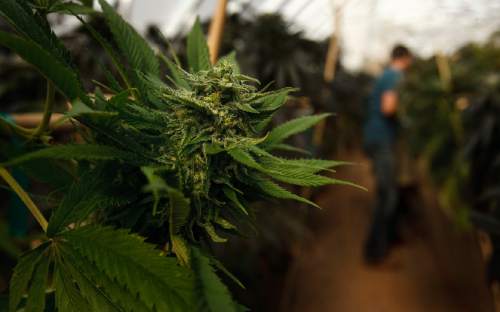This is an archived article that was published on sltrib.com in 2015, and information in the article may be outdated. It is provided only for personal research purposes and may not be reprinted.
Legalizing medical marijuana would open the door to a host of problems, including abuse by children and deaths from psychotic reactions, a Colorado drug-law enforcer warned Utah lawmakers Wednesday.
Jim Gerhardt, vice president of the Colorado Drug Investigators Association, provided the Health and Human Services Interim Committee with a litany of woes Utah's neighboring state has experienced since legalizing medical marijuana.
He showed pictures of people who have committed suicide after using pot or who have been killed by high family members. He played a chilling videotape interview of a cavalier teenager who had killed a motorcyclist with his own car while stoned. A house blew up because of improper electrical use for a grow operation, he said.
"This becomes a tangled mess for law enforcement," said Gerhardt, one of four speakers to address the committee in a three-hour hearing. Three were medical researchers.
It was the committee's second long hearing on the topic of medical marijuana this summer.
Saratoga Springs Republican Sen. Mark Madsen is championing legislation that would legalize medical marijuana.
His bill last session narrowly died in the Senate. Sen. Evan Vickers, R-Cedar City, said he, too, has a bill in the works.
Madsen called Gerhardt's testimony "very emotional and scary," but questioned how it applies to Utah.
"Have you read the bill and how it deals with everything you've highlighted here?" he asked Gerhardt. The Colorado drug investigator conceded he had not read the measure.
One witness invited by Madsen to testify by video link was Jahan Marcu, director of research and development at Green Standard Diagnostics and senior science adviser at Americans for Safe Access.
Marcu cited a study that found some cancer-fighting properties in pot and another that determined teens were unhurt by marijuana use.
Importantly, he said, deaths from opioids (prescription painkillers) have declined in Colorado since medical marijuana was allowed there.
Two Utah researchers said more research needs to be done on medical marijuana, including on dosages, interaction with other drugs, and which compounds might help with what conditions.
Lynn Webster, vice president of scientific affairs at PRA Health Sciences and a prominent pain physician, said Utah could become a laboratory for the research medical marijuana desperately needs.
It could perhaps reduce the use of addictive opioids, he said.
"The public has gone further than the science has, and there is a potentially significant benefit from measured and managed risk," Webster said. "We should be doing something to move forward. There is too much harm from opioids and too much suffering from chronic pain."
Annette Fleckenstein of the University of Utah sketched the basic biological effects of marijuana on the brain and urged lawmakers to read the National Institute on Drug Abuse's materials on it.
While there are many anecdotes about therapeutic benefits, "It really is important that we can begin to do these studies," said Fleckenstein, assistant dean for Foundational Sciences and deputy director of the Utah Addiction Center at the U.
Madsen laid blame for the lack of previous cannabis research on the federal government's long war on drugs.
"How long should we make those people suffer who know they can get relief while the folks in the lab coats catch up for all this bad government policy?" he asked Fleckenstein.
"I don't know that it's entirely the government's fault," she replied. "These are tough molecules to study."
Twitter: @KristenMoulton





